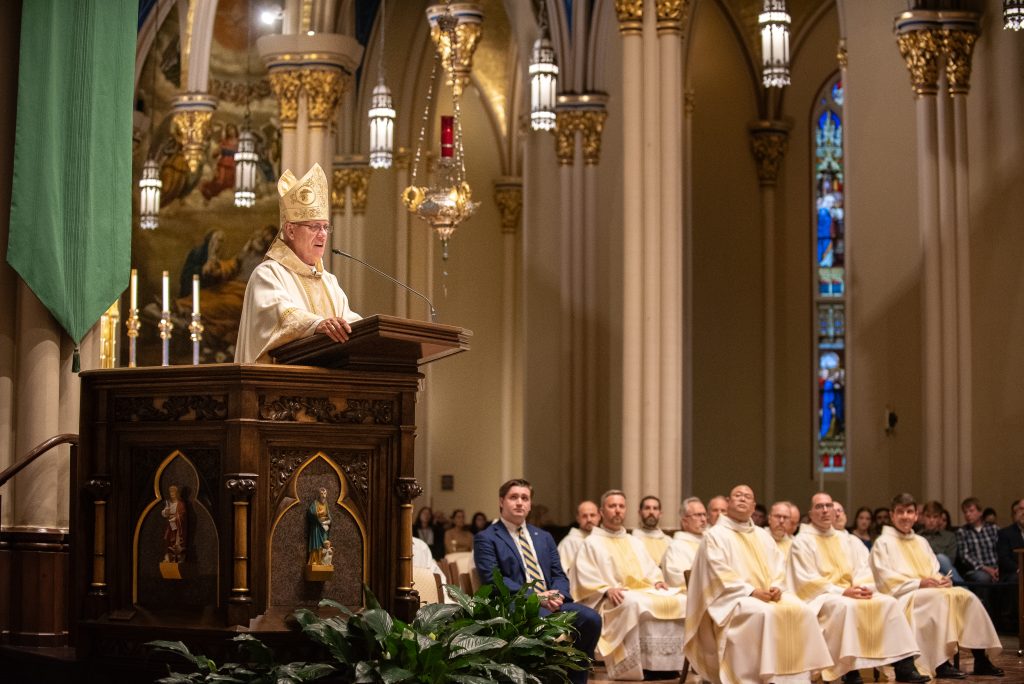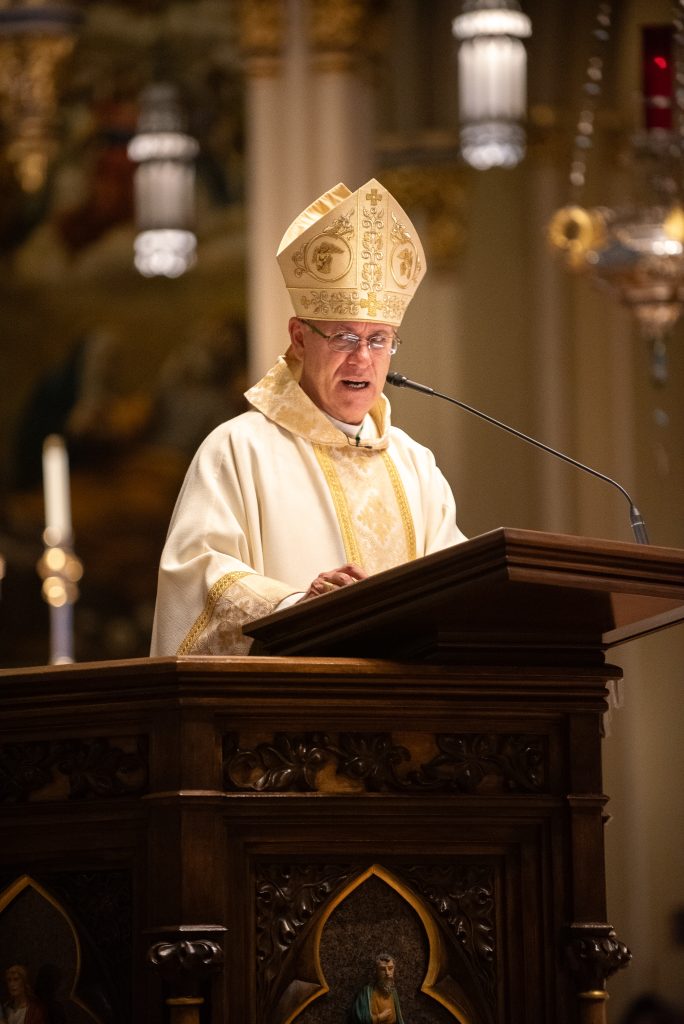November 7, 2023 // Bishop
Conference Grapples with Understanding Human Personhood
Centuries before the incarnation of Jesus Christ, Greek philosophers wrestled with the unknown – from who or what created the world, to how the stars and planets could help explain time and place, to mathematical equations and scientific processes that would spark the building of civilizations.
Included in their ponderings was a question that continues to be debated and discussed today – namely, what makes a human being distinctively human? What is the essence of the human person? Socrates believed the answer was rational thought, while his student, Plato, thought that to be human means one is a composite of a physical body and a soul by which that body is animated.
While it is a question that has perplexed the greatest of minds for ages, it seems we are no closer to a consensus on the definition of personhood, despite the serious efforts of men and women today who have dedicated themselves to finding an answer.
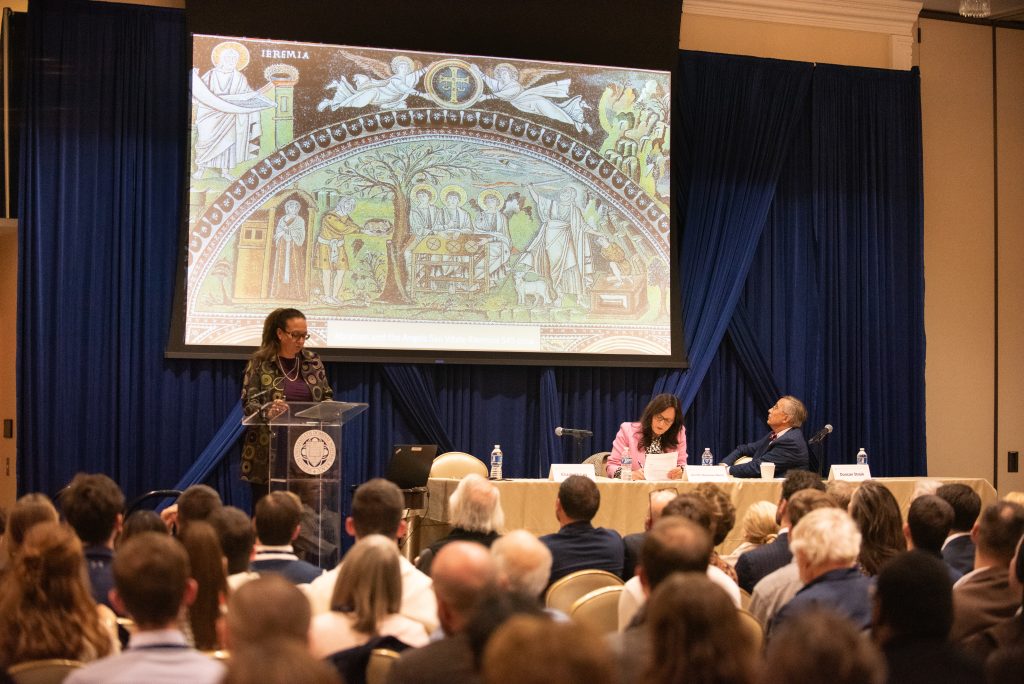
Art historian Elizabeth Lev speaks on the topic of “The Artistic Struggle to Portray the Divine Persons” on Friday, November 3, during the de Nicola Center for Culture and Ethics’ fall conference at the University of Notre Dame.
But the question isn’t raised only to give today’s philosophers, theologians, academics, and many others a meaningless mental exercise – philosophy for philosophy’s sake. Understanding what it means to be a person is vital to navigate the world we live in today.
To that end, the de Nicola Center for Ethics and Culture at the University of Notre Dame chose the topic for its annual fall conference, which was held on campus November 2-4.
“Every year, we aim to explore a broadly humanistic theme from a variety of interdisciplinary angles featuring a wide array of perspectives,” said O. Carter Snead, Director of the de Nicola Center and the Charles E. Rice Professor of Law at Notre Dame. “This year we thought that a theme ‘On Persons’ provided a sufficiently capacious point of departure for such exploration, given its multiple meanings and connotations (e.g., human persons, divine persons, ‘personalism,’ natural vs. legal persons, and the like). Substantively, we thought it was important to grapple with the topic and how it relates to identity, flourishing, and what we owe to one another, from the perspective of the Catholic moral and intellectual tradition, as well as other traditions.”
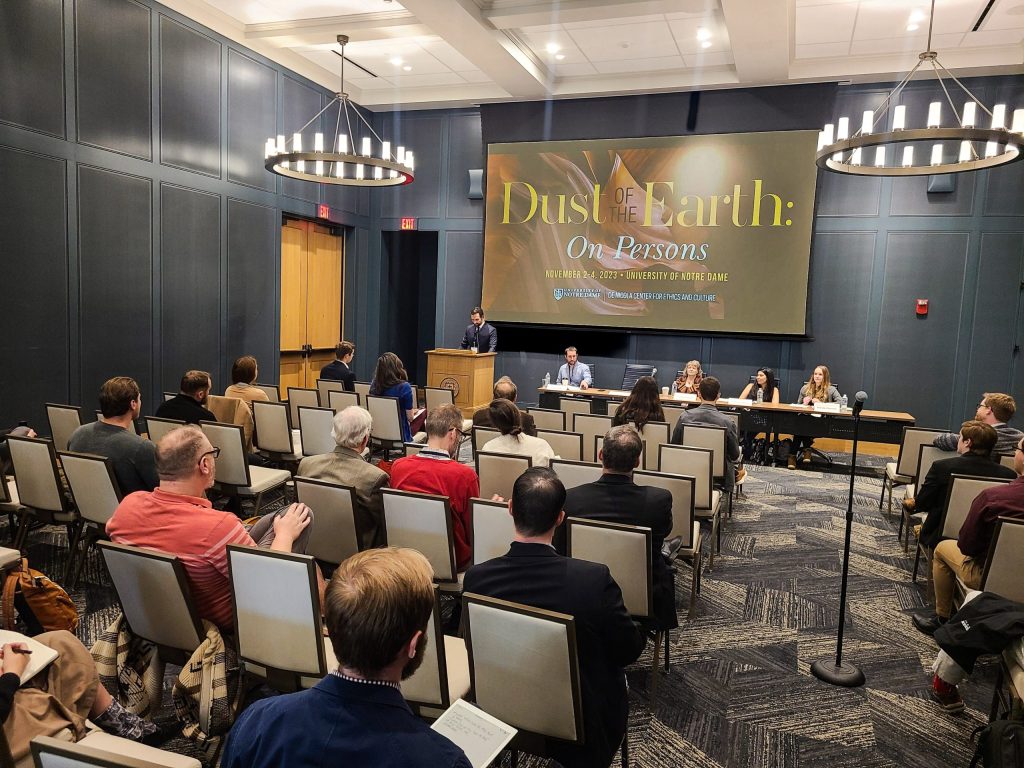
Photos by Scott Warden
Audience members listen during a panel discussion on how Catholics are called to interact with artificial intelligence programs during the fall conference of the de Nicola Center for Culture and Ethics at Notre Dame on Friday, November 3.
The de Nicola Center for Ethics and Culture was founded at Notre Dame in 1999 with the purpose of “sharing the richness of the Catholic moral and intellectual tradition through teaching, research, and public engagement, at the highest level and across a range of disciplines – both on campus at the University of Notre Dame and as Notre Dame in the public square,” according to its website. Snead said the center’s 23rd annual fall conference was attended by 1,200 “academics, students, policy makers at home and abroad, leaders of the Catholic Church, our fellow lay Catholics from all walks of life, as well as interested people from any tradition or perspective who are interested in pursuing the truth in friendship.”
In an introduction letter found in the conference’s program for participants, Snead wrote that “the concept of persons is, historically, a vexed one. Developments in biotechnology sciences, artificial intelligence, legal doctrine and practice, the social sciences, theology, ethics, art, and beyond raise distinctive questions, and there is no better place to explore those questions than at the fall conference.”
As Snead said, the theme “On Persons” gave presenters at the conference multiple angles from which to approach what personhood is and why it matters. Topics of panel discussions included “Genomes and the Human Person,” “The Moral Status of Persons,” “Personhood in Greek Literature,” “Personhood on the Margins,” “The Person in Canon Law,” “Catholic Resources for the Human Person’s Encounter with A.I.,” “Persons with Disabilities,” and “Persons, Artificial and Human.” In all, throughout the course of three days, there were 60 sessions with more than 150 experts seeking to explain distinct aspects of personhood.
Bishop Rhoades on Personhood
Days after returning from his participation in the general assembly of the Synod of Bishops in Rome, Bishop Rhoades celebrated Mass for conference organizers, attendees, and speakers on Friday, November 3, at the Basilica of the Sacred Heart on the campus of Notre Dame. During his homily, he explored the theme of the conference, reminding participants that “the inviolable dignity of the human person is a core teaching of the Catholic Church. We believe that the divine image is present in every person, thus making human life unique and sacred, of transcendent worth.”
This God-given dignity was front and center at the synod, Bishop Rhoades said.
“The whole notion of synodality and becoming a more synodal Church is based on our identity as the People of God journeying together as brothers and sisters in Christ with a mission within the whole human family. I heard moving interventions from delegates who came from areas of war and conflict, religious persecution, and extreme poverty. All felt a deep sense of communion with them and a call to greater solidarity with our brothers and sisters suffering in so many places.”
Bishop Rhoades continued, saying: “One night, we gathered in prayer for migrants and refugees with the Holy Father in St. Peter’s Square. It was a very simple prayer service in front of the bronze sculpture depicting a group of migrants and refugees on a boat, men, women, and children wearing clothes that show they originate from diverse cultures and historical moments. It was a very moving prayer service for me, much of it silent prayer, internalizing what Pope Francis so often reminds the world – to see migrants and refugees not as numbers but as human persons with faces, names, and personal histories, as our brothers and sisters. The Gospel for the prayer service was the parable of the good Samaritan, the parable that is at the heart of Pope Francis’ encyclical, Fratelli Tutti. In his homily, the pope spoke about those today who, in the face of the migrant crisis, cross on the other side of the road out of selfishness, indifference, and fear. He pointed to the good Samaritan as the model for us. He saw the wounded man and had compassion on him. He helped the poor traveler on the wayside, healed his wounds, and soothed his pain. He took him to an inn and cared for him. The Holy Father invited us to ask the Lord for the grace to draw close to all migrants and refugees who knock at our door.”
The Gospel reading for the Mass at Notre Dame featured Jesus’ healing of the man with dropsy. The story reminds us that “human life and dignity have primacy in the authentic interpretation of God’s laws,” Bishop Rhoades said. “Love is the greatest and fundamental commandment. Throughout the Gospels, Jesus manifests this truth. And the Church, His Body is called to live this truth.”
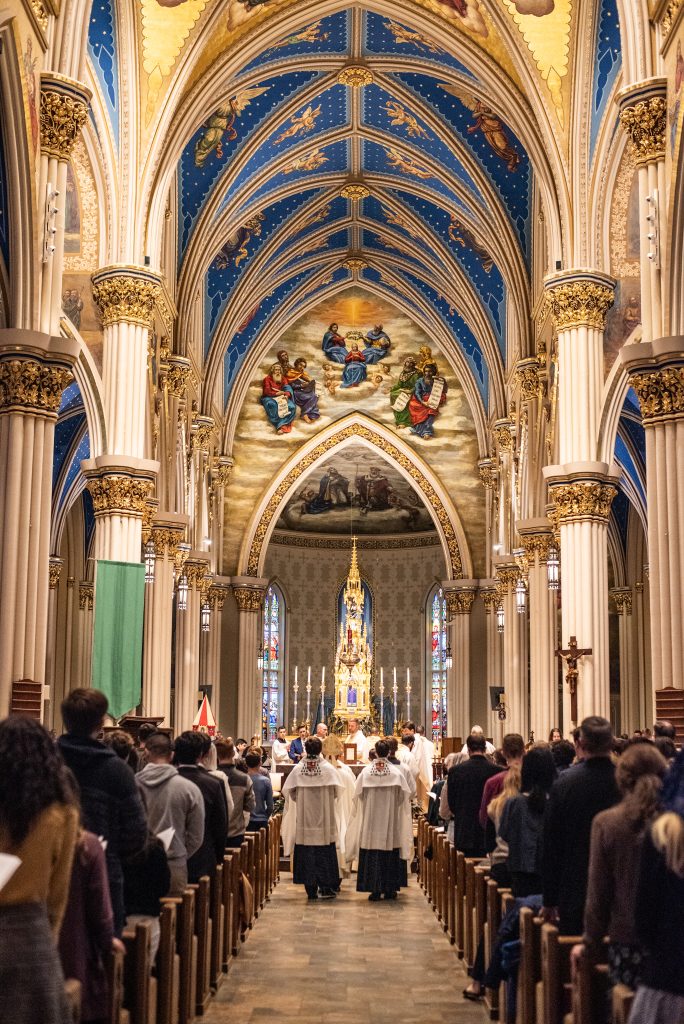
Altar servers and clergy process into Mass with Bishop Rhoades at the Basilica of the Sacred Heart at the University of Notre Dame on Friday, November 3.
The Mass was held on the feast of St. Martin de Porres, a man of mixed race who had his personhood questioned and even denied. “Yet Martin, himself a marginalized person, spent his life serving the needs of the sick, the poor, and the socially outcast,” Bishop Rhoades said. “He did so motivated by his deep faith.”
He was also motivated by his deep devotion to the Eucharist, Bishop Rhoades said.
“From his encounter with the Lord in the Eucharist and his experience of the Lord’s love in giving Himself to us from the cross, made present in the Eucharist, Martin was moved, like so many other saints of the Church, to live a Eucharistic life of self-giving love. If we are living the Eucharist, we cannot walk on the other side of the road in the face of human suffering. We cannot not be attentive to situations unworthy of the human person. Eucharistic Communion should wrench us from our individualism and conform us to Christ as we seek to walk together in fraternal communion with all our brothers and sisters in the solidarity that is necessary for true human progress and for building a civilization of love. May this conference on personhood help foster that communion and solidarity to which the Lord calls us!”
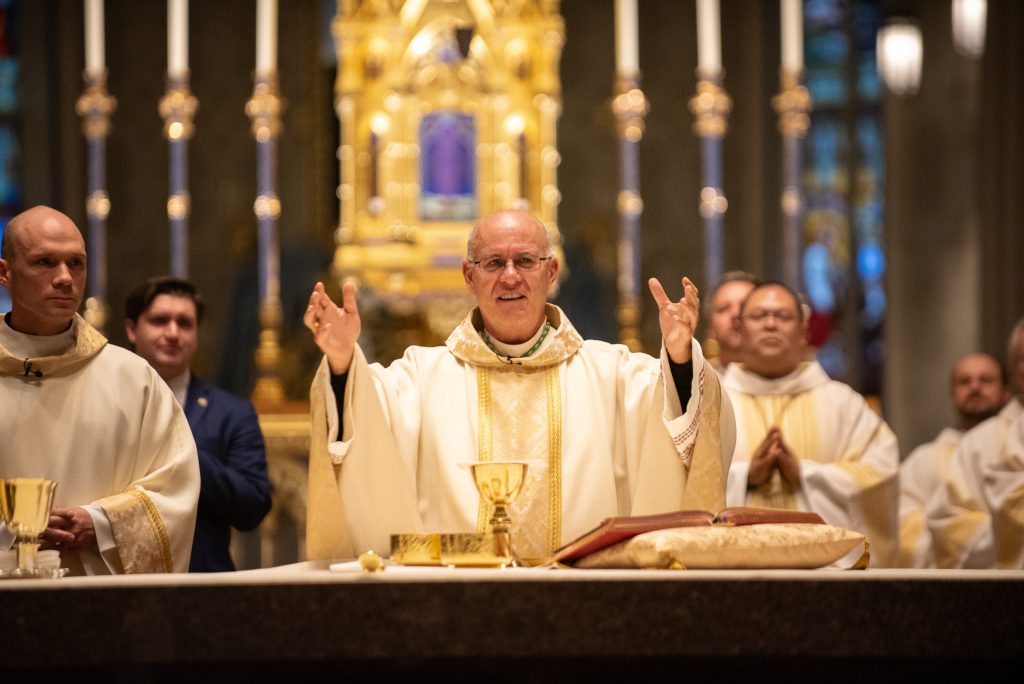
Bishop Rhoades celebrates Mass for conference speakers, organizers, and attendees at the Basilica of the Sacred Heart at Notre Dame on Friday, November 3.
The best news. Delivered to your inbox.
Subscribe to our mailing list today.







